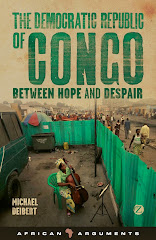During 2011, a year of pretty much unending rough waters, a number of interesting books nevertheless came into my life and. As I have done in years past, I wanted to share my thoughts about some of the more notable ones here.
Best regards and hopes for a 2012 with more love, peace, prosperity and life.
Ayibobo.
MD
A Palace in the Old Village By Tahar Ben Jelloun
A moving and perceptive chronicle of the lives of a Moroccan immigrant and his family in modern France, Ben Jelloun's novel descends into surrealistic absurdity in its final pages but before doing so nevertheless gives us an important glimpse into the experience of the “new” French in their adopted country.
Terror in the Land of the Holy Spirit: Guatemala under General Efraín Ríos Montt, 1982-1983 by Virginia Garrard-Burnett
An important and exquisitely researched book that sheds light on one of the most violent periods of Guatemala’s violent history, this work by University of Texas professor Virginia Garrard-Burnett examines the March 1982 to August 1983 rule of Efraín Ríos Montt. Ríos Montt, a former general, candidate in the 1974 Guatemalan elections (which he likely won but had stolen from him by the same military he had once served) and subsequent founder of Frente Republicano Guatemalteco, seized power from another military man, General Romeo Lucas García, who had presided over what Garrard-Burnett characterizes as “a rapid downward spiral of capricious violence and death.” Those hoping for a break in the country’s civil war, however, - which would only end with 1996 peace accords - were in for a rude awakening. Ríos Montt’s anti-guerrilla campaign, centred largely on indigenous peasant communities, was “more methodical and less chaotic than Lucas García counterinsurgency, but it was also more deadly.”
Ríos Montt’s idiosyncratic populism at the time, propelled forward by his evangelical Christianity, revealed the general to be “anything but a puppet of the far right,” notes Garrard-Burnett. “(He) believed himself to be a prophetic leader, brought by Providence to power at a particular moment in history in which he could lead the people of Guatemala against the forces of evil that besieged them on every side.”
The result was cataclysm, and Garrard-Burnett expertly documents it in great detail here.
Lords of Misrule: Mardi Gras and the Politics of Race in New Orleans by James Gill
A book about the often racially-charged origins of some of the major krewes of New Orleans' storied Mardi Gras (such as Comus, Rex and Momus), this book by a British-transplant living in New Orleans masterfully draws back the curtain on an aspect of the city's carnival revelry that many in its still-ossified economic structure would likely just as soon forget.
The Art of Political Murder: Who Killed the Bishop? By Francisco Goldman
A gripping account of the investigation into the April 1998 murder of Guatemalan Bishop Juan José Gerardi Conedera, this book (written by the Guatemalan-American novelist Francisco Goldman) reads like a detective novel and reveals the corrupt linkages of Guatemala’s criminal and military elements. A compelling picture of the struggles of committed individuals against a diffuse and often lethal enemy, it also contains disturbing suggestions about the activities of Guatemala’s incoming president, former General Otto Pérez Molina.
Carnival of Fury: Robert Charles and the New Orleans Race Riot of 1900 by William Ivy Hair
More a pogrom against the Africa-American population of New Orleans than a riot, this account by Ivy Hair tells the story of Robert Charles and, along with the work of historians like John Hope Franklin, serves as an important reminder to Americans of the brutal injustices inflicted on African-Americans after the Civil War, all in the name of scuttling the aims of Reconstruction in the American South.
The Spanish Civil War: Reaction, Revolution and Revenge by Paul Preston
Another example of how a military leader viewed a civil war as a moral-religious crusade, this book by one of the best historians of Span’s recent history makes one wonder how Spain’s Francisco Franco escaped his proper place in the annals of history’s great monsters alongside Hitler and Stalin.
The scale of the slaughter by Franco’s forces - 3,000 killed in Zamora, 3,000 in Valladolid, 2,789 in Navarra, and on and on - still shocks, and Preston lays blame where it belongs, on the shoulders of such largely forgotten Francoist chieftains as General Juan Yague. Preston’s deft exposure of Franc’s “notion of a war of moral redemption by terror,” makes one look forward with expectation to his forthcoming book, author of the much-anticipated forthcoming The Spanish Holocaust: Inquisition and Extermination in Twentieth-Century Spain.
Africa's World War: Congo, the Rwandan Genocide, and the Making of a Continental Catastrophe by Gérard Prunier
An expansive yet nuanced view of the first and second Congo wars, this book is an essential addition to scholarship on the region. Prunier, a longtime observer, analyst and resident of Central Africa, is also an unusually honest and self-critical academic, a fact that adds gravitas to his criticisms of African governments and the international community when dealing with the region’s severe, but by no means intractable, problems.
Finding Fernanda: Two Mothers, One Child, and a Cross-Border Search for Truth by Erin Siegal
This debut book by journalist and photographer Erin Siegal has a mystery at its core: What happened to the two young daughters of an impoverished Guatemala woman named Mildred Alvarado, one of whom was literally snatched from her mother’s womb? But the book — comprised of heavy-duty investigative reporting and compelling personal testimony — also examines another mystery: How could so many people in Guatemala and the United States turn a blind eye for so long to an industry that, far from being motivated by the altruistic urge to unite needy children with loving families, has become a world where adults dole out children like cards from a deck and view their young lives as little more than a commodity to be exploited? I reviewed it for the Miami Herald.
Dancing in the Glory of Monsters: The Collapse of the Congo and the Great War of Africa by Jason K. Stearns
An interesting book that very laudably seeks to bring the experiences of the Congolese themselves in their own voices to the forefront of an account of that country’s ongoing conflicts. Perhaps a little soft for my taste in its assessments of the failings of the international community and non-governmental organizations operating in Central Africa, but all in all a highly worthwhile read that brings the reality of the conflict home via the eloquent voices of the Congolese who suffered its consequences
Rigoberta Menchu and the Story of All Poor Guatemalans by David Stoll
A serious and groundbreaking scholarly work that was unfortunately subject to rather vehemently libelous calumny when it first appeared in 1999, this book sees Stoll - probably the best American anthropologist working on Guatemala - examining both the specifics and broader historical context of the autobiography of perhaps the most famous living Guatemalan. On the way, much as he did with his excellent previous volume, Between Two Armies in the Ixil Towns of Guatemala, Stoll gives the reader of nuanced picture of the torturous position that Guatemala’s indigenous population found itself in during that country’s long civil war and raises some troubling questions about the veracity of Menchu’s famous autobiography.
Memoirs of Hecate County by Edmund Wilson
A relic from the days when American cultural and political commentators actually had a brain, this collection of loosely-connected short stories casts a witty and darkly jaundiced eye on the upper-middle classes of a fictional bedroom community outside of New York, and within the city itself during the years between the great wars. Wilson, who had previously made his mark with his history of revolutionary thought in Europe, To the Finland Station, was as original and probing a mind as American letters has produced.
Subscribe to:
Post Comments (Atom)




No comments:
Post a Comment